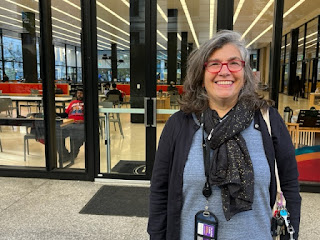I have made it to the UK and it’s
about to begin - first stop Manchester on Monday. But before it does, I have
been reflecting back on what brought me here.
Today I dug out the remarks I made at the Churchill Fellowship dinner in
2019. Sharing below for a little context.
****
In the summer of 2016, literally
over the period of just a few weeks, homelessness – specifically, rough
sleeping – became a very visible issue
in Melbourne.
At the time I’d been managing the City of Melbourne’s homelessness team for a few months. Our team was a small group of mainly social workers, neatly enveloped in a section of the Council that focused on the welfare of city communities. We delivered a homelessness strategy that committed to develop sustainable pathways out of homelessness and our work was embedded in a protocol aligned to the Universal Declaration on Human Rights.
When the first complaints were raised – and they were very legitimate concerns – from business owners, residents and visitors about access to property, safety and amenity we made every effort to respond respectfully. Very early on we saw that we had to work widely with a broad range of stakeholders, including our own city cleaning services, park patrols, building surveyors and local laws teams, as well as a number of homelessness agencies in the city.
A few months later, a major city newspaper started a campaign, running front page stories aimed at the Council, to take action and remove any indication of homelessness off the streets.
What followed over the next year, you might remember - a sit in protest by people experiencing homelessness at City Square, a large group and confrontations at Flinders Street Station and a former Council introducing a review of our city’s local laws that would effectively limit how people used our streets and potentially fine people for rough sleeping in the city.
That was a confronting time for our small team of social workers, but a community engagement process allowed more than 3000 people to tell us that Melbourne was a caring city and not one that criminalised homelessness.
The thing I learned through the experience was this – that while simple geography often places councils at the forefront of response, we are often ill-equipped to meet the complexities of individual situations and torn by conflicting responsibilities.
Rough sleeping happens on our streets and many people expect us to do something about it.
Paradoxically, we are often held account for doing too much and for not doing enough.
The challenge that local government faces is in the unique role that we play. We are one organisation fulfilling many roles, responsible to many different stakeholders.
We have people doing my kind of job and others who are responsible for keeping our streets and parks clean and safe for everyone, activating the local economy, collecting rates to manage roads and rubbish.
We also have limited access to funds – council budgets are nothing like what the federal and state governments have at their disposal. Traditionally we have not been the providers of housing and social support, that are key to ending homelessness.
In talking to counterparts in other parts of Victoria and around Australia I realised that our predicament was not unique. While there is a lot of information available about the role councils play in addressing homelessness, there is very little about how we navigate these internal operating challenges that sit at the core of what we aim to do.
This is what ignited my interest in applying for a Churchill fellowship.
For my fellowship, I will be travelling to the UK, US and Canada to compare the various ways that councils are responding to rough sleeping while balancing responsibilities to the wider community.
I’ll be looking into how Councils navigate the complexities of homelessness internally and use collaboration and partnerships to foster better outcomes.
My intention is to document lessons, examples of good practice and develop guidelines that will help improve the responsiveness of local government in big Australian cities and regional areas.
This fellowship really is a dream come true. I am very thankful to the Churchill Trust for providing me the opportunity to explore this issue and build my sector’s knowledge. I look forward to coming back to share my findings.
***




So it is really happening...interesting time given the state of the UK economy and crumbling institutional structures. You will have to post lots of pics!
ReplyDeleteYes Glenn, hard to believe. Two days in and I have seen so much already. Lots of photos coming.
Delete